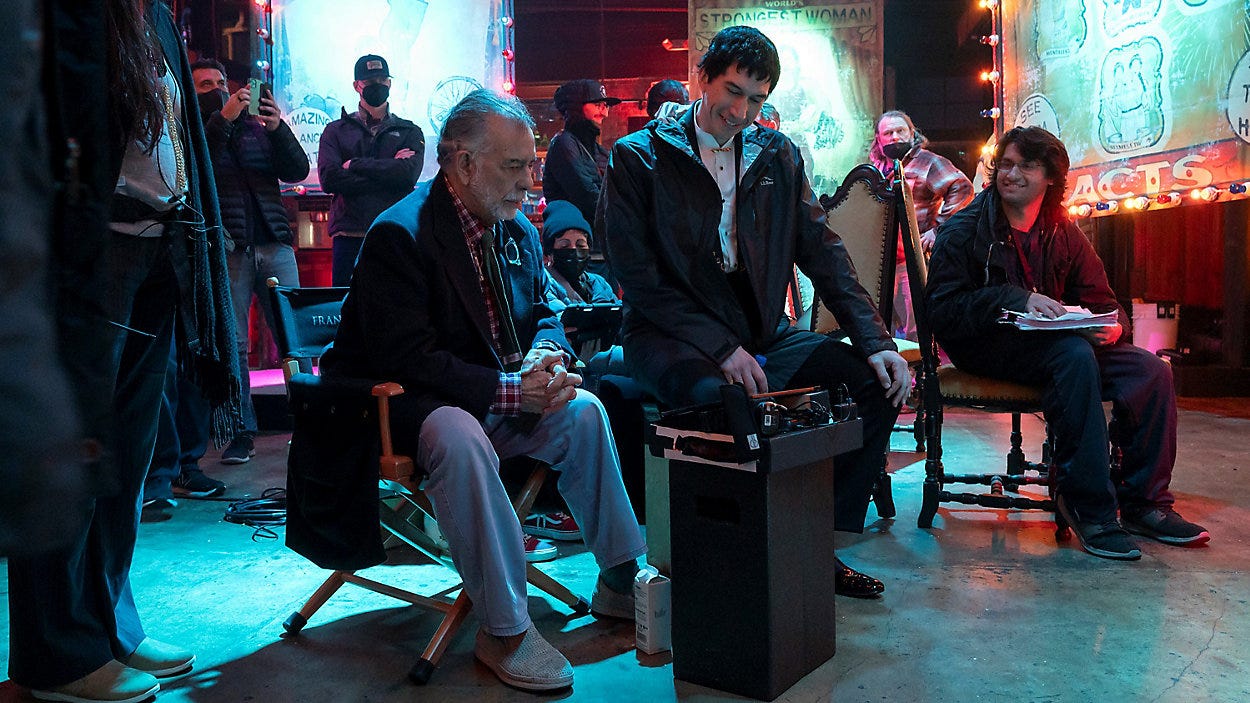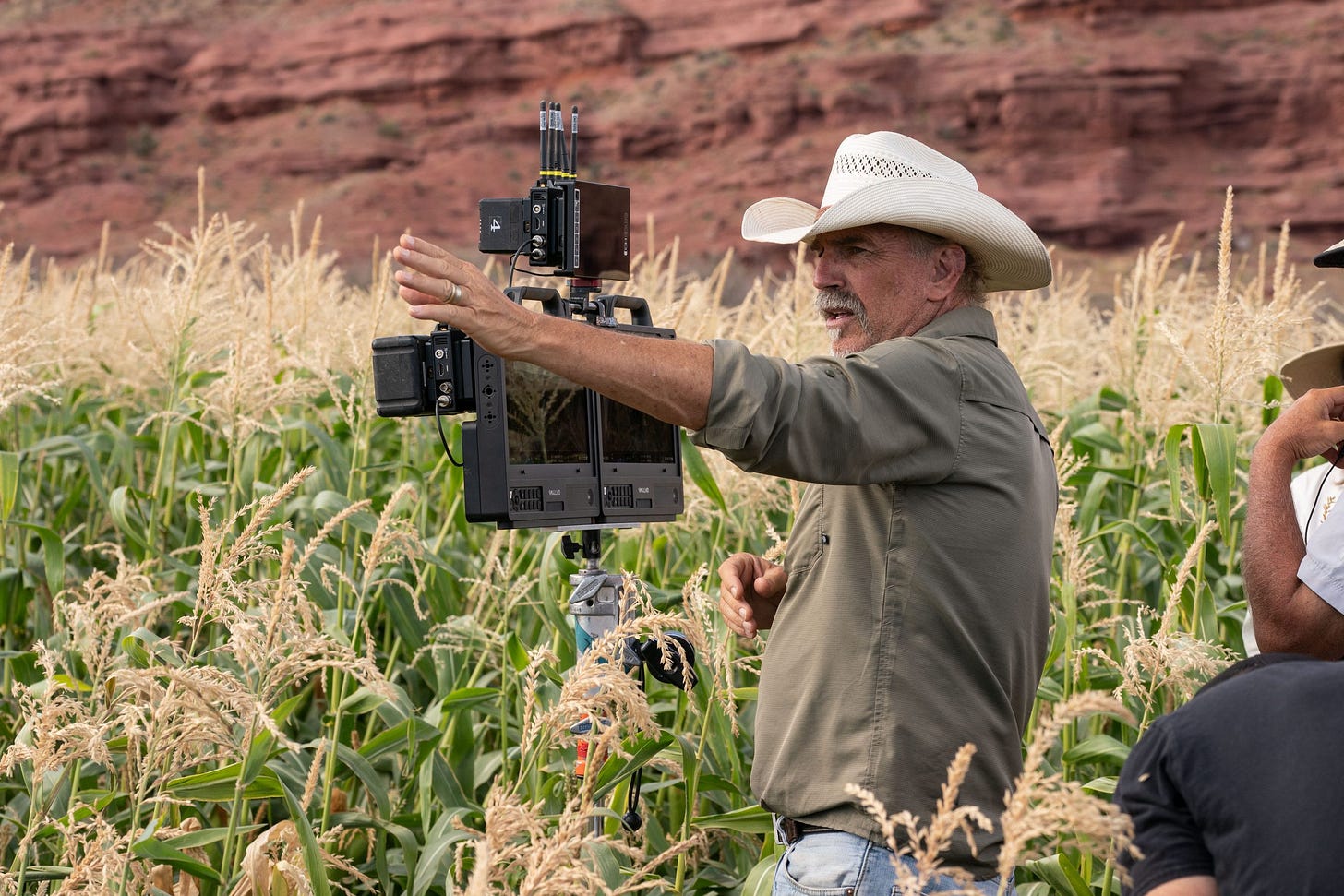Is It Time for the Great Directors to Retire?
2024 was a Terrible, Horrible, No Good, Very Bad Year for Auteurs
As we barreled head-first into the Year of our Lord 2024, there were two movies so daring in conception that they immediately catapulted to the top of my most anticipated movies list. On paper, these two projects had a lot in common. Both were ambitious, self-funded passion projects written and directed by Oscar-winning mavericks. Both were provocative in their ideas, populated by impressive, sprawling ensemble casts. Both were tricky business ventures labeled as box office poison. Sadly, that’s not where the similarities end.
The movies in question, Kevin Costner’s Horizon: An American Saga and Francis Ford Coppola’s Megalopolis, were unmitigated disasters. My most anticipated films of the year were, in fact, the worst of the year.
Sadly, I was not alone in my disappointment. Collectively, both movies grossed a catatonic $51.7 million worldwide. The release of Horizon’s second chapter, originally scheduled to be released six weeks after the first installment, was put on ice. Nearly six months later, there is no word on whether audiences will ever see it. Funding on parts three and four has allegedly dried up. Coppola’s self-funded disaster found staunch defenders on Film Twitter, but audiences balked at the confounding premise and execution. It recouped only a tenth of its budget—before marketing costs were considered. It is one of the costliest failures in box office history.
With the advent of a new crop of directorial standard bearers—Nolan, Villeneuve, Gerwig, and Peele, to name a few— the importance of the last few New Holywood directors has come into question. A decade-long decline in audience interest, critical reception, and commercial viability surrounding recent projects threatens to tarnish their legacies. As Spielberg and Scorcese have revitalized their careers, the former with his five times Oscar-nominated, one-two punch of West Side Story and The Fablemans and the latter with the acclaimed crime western Killers of the Flower Moon, their contemporaries flounder.
As morbid as it is, it’s hard not to look at the failures of Horizon and Megalopolis as nails in the coffin. Here is Francis Ford Coppola, the filmmaker who had arguably the greatest run in film history, brought down to levels of commercial failure that not even 1982’s doomed romantic musical One From the Heart could fathom. And here is Kevin Costner—the movie star turned director who triumphed over Scorsese and Goodfellas at the 1991 Academy Awards— cashing in on his television fame only to learn the hard way that audiences aren’t invested anymore in what he has to say. And while the question is easy to ask, the answer is harder to parse (you can blame the click-baiting title on me).
Obviously, not all the Greats need to retire.
However, it’s high time some look in the mirror and consider how they want to spend their remaining years and resources.
Coppola and Costner make for a fascinating Plutharcian comparison. Both men made their careers—and owe their greatest achievements—to big, self-funded risks. When no one else was willing to bet on them, these two bet on themselves. The hellish grandeur of Apocalypse Now, often considered the greatest war film ever made, almost sent the five-time Oscar winner into bankruptcy as a disastrous production went from five months to 238 days. A first-time director, Costner invested $3 million of his own money to produce Dances with Wolves, which has since been credited with revitalizing the dormant genre. Their gambles paid off, and their “follies” became the stuff of Hollywood legend.
However, their successes were only matched by the number of failures. Costner notoriously followed up Dances with an unmitigated bomb in The Postman. Coppola’s One From the Heart almost singlehandedly bankrupted his studio, American Zoetrope, forcing this Master to do paycheck jobs to survive. I’m not a betting man (except for one time that Caleb and I bet on horses down in Louisville) but I know that when you bet everything on yourself every single time, you’re inevitably bound to lose it all at some point.
Time after time, the two men creatively dug their heels in and kept coming up short. Then, after several critical and commercial disasters, their names vanished from directing credits and marquees. Apart from three experimental, arthouse films, Coppola’s last wide theatrical release was in the year I was born, 1997’s The Rainmaker. Costner stopped directing in 2003. In those twenty-plus years, the two men separately (yet oddly in tandem) developed sprawling epics that played into the legends that sprang up in the wake of Dances and Apocalypse Now. Once again, they would risk it all creatively and financially.
The dramatic productions of 2024’s auteur disasters have been so well documented for so long that it’s a waste of ink to recap them for the average audience. At the very least, most people who have a Facebook account know that Costner departed Taylor Sheridan’s hit show Yellowstone to focus on directing his four-part epic. Recently, Costner’s Yellowstone character met an unpleasant end, naked just feet away from the toilet. This is undoubtedly a mountain-sized middle finger to the show’s star who abandoned his prior commitments. That’s even without mentioning the $33 million that Costner himself invested!
Coppola, on the other hand, sold the majority of his famous wine business to fund the entirety of Megalopolis’ $120 million budget. When filming did commence in Atlanta, it wasn’t long before industry bulletins started reporting on allegedly toxic working conditions. Coppola, notorious for his manic persona on the set of Apocalypse Now, was allegedly “unprofessional” on set. Several female extras accused him of sexual harassment, accusing the filmmaker of kissing e and forcing them to sit on his lap, and that, without an HR department on set, no adequate response occurred. Coppola has denied these claims, and some of the on-set extras have defended him. A libel suit is ongoing.
Sadly, even if the productions of Horizon and Megalopolis had gone smoothly, the movies still would have sucked. The reasons? Ego and unchecked power. With creative control, as well as a lack of oversight from any Hollywood studio to offer cost-effective solutions, Coppola and Costner had no one pushing back. There was no one to say “no.” On their sets, they were gods. After all, why wouldn’t they be? These are the men who redefined genres for the twenty-first century, picking up accolades and acclaim for their big swings. Not only that, but they viewed themselves as visionaries: Coppola, presenting a prescient view of a utopic world that could be saved by dialogue and goodwill, and Costner, creating an episodic kaleidoscope of Western Expansion that both validates and condemns our past.
But if they viewed themselves as gods, in reality, they were both Icarus. Flying too close to the sun, and with no one to tell them “no,” they made bloated, self-congratulatory disasters. When the box office receipts and reviews started pouring in, the last of their goodwill in the industry melted away. They crashed to earth. What comes next after they pick themselves up has yet to be determined.
It’s hard for me to sit here and write that artists shouldn’t make art. Over the course of the few hours that I’ve been writing this blog, the Latin motto of MGM Studios kept coming to mind: Ars Gratia Artis.
Art for the sake of Art.
Artists should be allowed to reach for the stars, to stumble, and to fall. They should also be allowed to pick themselves up and find new ways to tell the stories closest to their hearts. Not to blend work and life too much, but it’s one of the great benefits of having the Free Speech Culture we do in this country. Someday, God willing, I hope I could be afforded that chance if I were to make a creative misstep.
Costner would benefit by returning to a smaller story, like 2003’s Open Range. But it’s much harder to look at where Coppola is and argue that he should pick himself back up and keep making movies. Lawsuits and allegations aside for the moment, the self-inflicted disaster of Megalopolis feels unlike anything the movies have seen in decades. Decadent, discombobulated, and detached from reality. In the aftermath of the 2024 presidential election, it feels even more like a misguided Liberal pipe dream that woefully misread the political tenor of the moment. Time might be kind to the immodest fever dream, but it neither inspired the masses nor brought them back to the theaters. In fact, it alienated people.
Art for the sake of art is the beau ideal for filmmakers. But it must also be remembered that movies are, at their purist, a populist art form. A director’s next project depends on how well the people respond, critically and commercially. While filmmakers like Coppola can survive a blow or two to the hull, they cannot endure the constant lambasting like the one ol’ Francis received in the aftermath of Megalopolis. At some point, a movie has to make money. Neither Horizon nor Coppola’s sci-fi counterpart managed to do so. The solution for Costner is to send Horizon to HBO as a four season television show and make smaller theatrical efforts. For Coppola, the time might have come to close the curtains.
This wasn’t a fun write. It’s hard to suggest that the man who made The Godfather, Apocalypse Now, The Conversation, Rumble Fish, and produced classics like American Graffiti should stop directing. It might be comparable to suggesting a fish stop swimming or humans stop breathing. But time marches on, and no one is immune to its ever-forward trajectory. At 85-years-old, I hope Coppola can look back at what he’s given the world and be at peace with the artistic treasure trove he has left us.
Encouraging him to return to the director’s chair would be elder abuse.








Mentoring is a way for these movie greats to make a difference in helping develop the next generation of movie makers! Just because Coppola is 85 years old does not mean that he can’t provide the wisdom and lessons learned to others. Love of the art of movie making can never be erased despite the age of someone or the failure of a movie in the eyes of moviegoers. Learn from others to make a difference moving forward to tell a story that stirs the heart and captivates the soul.
No